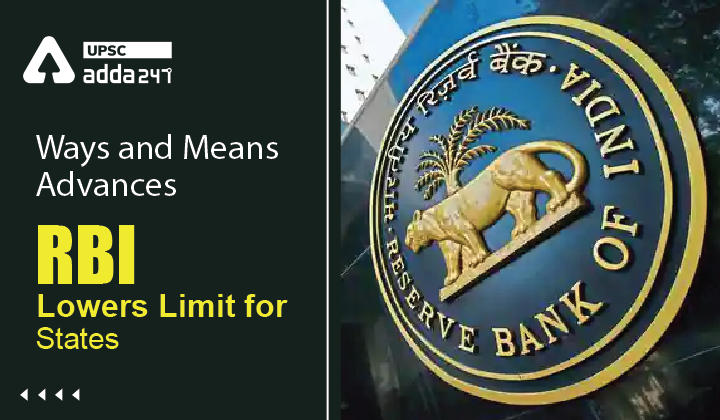Table of Contents
Ways and Means Advances UPSC: Relevance
- GS 3: Indian Economy and issues relating to planning, mobilization, of resources, growth, development and employment.
Ways and Means Advances RBI: Context
- Recently, Reserve Bank of India has decided to reduce the Ways and Means Advances (WMA) for States and Union Territories (UTs) to ₹47,010 crore from ₹51,560 crore.
Ways and Means Advances: Key points
- RBI had raised the WMA limit to ₹51,560 crore for all States, due to the COVID-19
- The higher Way and Means Advances was applicable till March 31, 2022.
- RBI has also said that the Special Drawing Facility (SDF) availed of by State governments/ UTs would continue to be linked to the quantum of their investments in marketable securities issued by the Government of India, including Auction Treasury Bills (ATBs).
- The interest rates on SDF, WMA and OD (Over Draft) shall continue to be linked to the Repo Rate.
What is Ways and Means Advances (WMA)?
- WMA is a mechanism used by the RBI to fund states to help them to tide over temporary mismatches in cash flows.
- Borrowings through WMA are to be repaid within three months and usually offered at the repo rate.
About WMA
- There are two types of WMA: Normal Ways and Means Advances and Special Drawing Facilities.
- SDF are issues against government securities held by States as collateral.
- Any amount drawn by a state in excess of the normal WMA is an overdraft (OD).
- There is a State-wise limit for the funds that can be availed via WMA.
- These limits depend on many factors, including total expenditure, revenue deficit and fiscal position of the State.
WMA rate of interest
- The rate of interest applicable for normal WMA funding from RBI is the repo rate.
- Overdrafts, however, are given at repo plus 2 per cent.
- The interest levied for special WMAs could be lower than the repo rate due to the backing of government securities.
Significance of WMA
- WMA provides a financial cushion when there’s uncertainty in revenue collections due to stressed economic conditions.
- WMA helped states that were in need of immediate and large financial resources to deal with challenges, including medical testing, screening and providing income and food security to the needy during COVID-19 pandemic.
- WMA can also be an alternative to raising longer-tenure funds from the markets, issue of State government securities or borrowing from financial institutions for short-term funding.
- WMA funding is much cheaper than borrowings from markets.
Read current affairs for UPSC





 TSPSC Group 1 Question Paper 2024, Downl...
TSPSC Group 1 Question Paper 2024, Downl...
 TSPSC Group 1 Answer key 2024 Out, Downl...
TSPSC Group 1 Answer key 2024 Out, Downl...
 UPSC Prelims 2024 Question Paper, Downlo...
UPSC Prelims 2024 Question Paper, Downlo...




